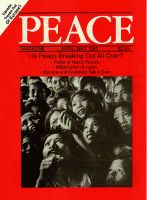
Peace Magazine Apr-May 1989, page 22. Some rights reserved.
Search for other articles by Jean Smith here
Kevin McMahon, Arctic Twilight Toronto: Lorimer, 253pp, $16.95
KEVIN MCMAHON HAS written a passionate and despairing account of the waste, insensitivity and sheer stupidity of what we are doing in the North in the name of defence, sovereignty and economic development. The sub-title is Reflections on the Destiny of Canada's Northern Land and People. From his description, that destiny is bleak indeed.
He writes eloquently about how the Inuit have been made spectators in their own land: Forced to use or be used by materials, systems and language that negate the value of everything they have learned in the past, they are at the same time kept from contributing to what is going on in the present in a meaningful way. They have lived in a harsh climate, but have been able to support themselves. Not with ease, and not without calamity, but they did support themselves. Working for wages, usually on short-term jobs, has meant an easier life for some of them, but at a terrible cost in terms of poor health, unemployment and the loss of control over their own lives.
The Federal Government, in inviting the U.S. and Canadian military to establish bases in the Arctic, said that they must not interfere with the native people and must clean up after themselves when they left. Those injunctions were more honored in the breach than in the observance. After disrupting communities by the sudden inundation of materials, equipment and noisy machines that scared away the wildlife, military installations could be just as suddenly abandoned, leaving the Inuit with a spoiled landscape, a dependency on wages that were no longer available, and a severely altered way of life. In one case, the U.S. military left old transformers that leaked an estimated 1000 litres of PCBs before they were removed twenty years later to Alaska, leaving contaminated ground that still presents a health hazard.
Inuit were relocated from northern Québec to Resolute Bay in the High Arctic to establish Canadian sovereignty. McMahon calls this a shameful indictment of our attitude toward native peoples. Told that they could return to their original homes in two years if they were not happy, they discovered that they could indeed return-at their own expense. Since this was beyond their means, they were doomed to remain there. They were desparately unhappy, and McMahon paints a sad picture of how boredom, alcohol and drugs led to violence and death-as has happened in other communities affected by our interference.
The Inuit have learned through TV that Canada has enemies and, being patriotic-God knows why-they are prepared to help defend it. But they cannot understand why they should have to fight or kill Inuit on "the other side." Though they have known violence, they look on killing as stupid, and cannot understand why others are disposed toward it. Mindless killing, McMahon asserts, is only one of the confusing messages they get from TV, and the chapter on beliefs and the effects of television is one of the finest in the book.
McMahon sends a strong message about continuing devastation in the North. Despite its gloomy message, it is a good read, informed by intelligence, sensitivity and humor. Having observed a magnificent display of northern lights, the author writes, "The military hates the aurora borealis because it messes things up. Radars can't tell the northern lights from a squadron of bombers; satellites read them as missile launches an they screw up the guidance systems of weaponry." That filled him with optimism because, "It was as if the sky itself was reaffirming the meaning and power of life by throwing a monkey wrench into the system."

Peace Magazine Apr-May 1989, page 22. Some rights reserved.
Search for other articles by Jean Smith here